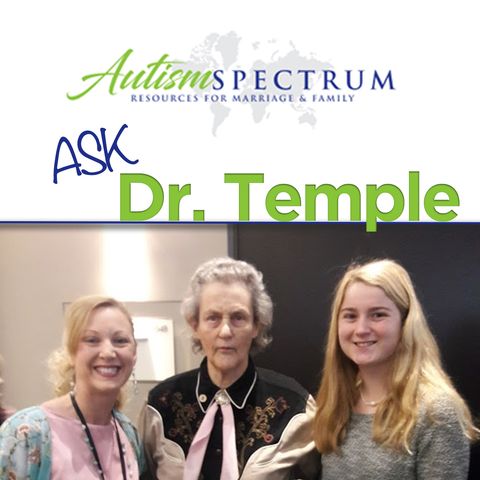Ask Dr. Temple Grandin

Download and listen anywhere
Download your favorite episodes and enjoy them, wherever you are! Sign up or log in now to access offline listening.
Description
Sydney Holmes interviews Dr. Grandin with questions collected by young adults and adults on the autism spectrum for Dr. Grandin. Questions range from early intervention to handling dysregulation at work....
show moreSee Dr. Grandin's full bio on April 4th show with Dr. Grandin.
Questions from the autism community:
1. My first question is from Savannah from SC. We broke her question down into a few questions on her topic. The first question is will you talk about sensory processing and the brain and the second question is how can early intervention of identification of sensory issues help a person? Next, how do you or did you manage some of your sensory issues?
2. Hannah from Albuquerque asks- When someone experienced bullying as a child- how do you recommend working through that? Follow up on that- did you experience bullying for your difference and how have you managed or worked through that?
3. Sage from Arkansas has a question about reducing the stigma about autism in higher education; In class, a professor required reading for the curriculum that called autism a disease and spoke of it needing to be cured. The professor knew there is a person in the class on the spectrum who is receiving accommodations and also does not really feel people should receive accommodations. What can be done or how do we help break the stigma of autism in higher education? Follow up can you speak to schools of higher education/professors of how this affects students on the spectrum who are referred to negatively in class and are called out for needing accommodations?
4. I (Sydney) have a question in that same area of higher education- as I am working on my Master’s and would one day like to pursue a Ph.D. but I need to recuperate from the stress of this Master’s defense process... I was not able to get professors to understand that while I have a high IQ and can do the work, I still am on the autism spectrum and struggle with sensory and anxiety, and when people do not follow the academic rules or guidelines or change the schedule without notice that these are true needs to consider in a graduate program. I expect to follow the academic rules but when those on the committee are not or say they will email by a certain time and do not but they expect me to keep a guideline or date but they did not get me the information needed to meet that timeline- the amount of anxiety and sensory issues this produces makes functioning almost impossible- what are your suggestions or how do you deal with a challenging or difficult committee or chair who won’t follow guidelines or not willing to hear or understand accommodations needed because of autism/anxiety?
I have two questions 1. Did you receive accommodations or how did you work through the academic games and rules and hoops for defending your thesis and dissertation? Suggestions for us on the spectrum who want to pursue graduate work?
5. From an adult in NC, what training or what do police need to know in dealing with autistic adults who may go mute under stress and explain pacing or other stims that are misinterpreted by the community and community workers.
6. Dan in Georgia, what are tips or recommendations for working through anxiety and becoming more resilient.
Information
| Author | MHNRN, LLC |
| Organization | MHNRN |
| Website | - |
| Tags |
Copyright 2024 - Spreaker Inc. an iHeartMedia Company
